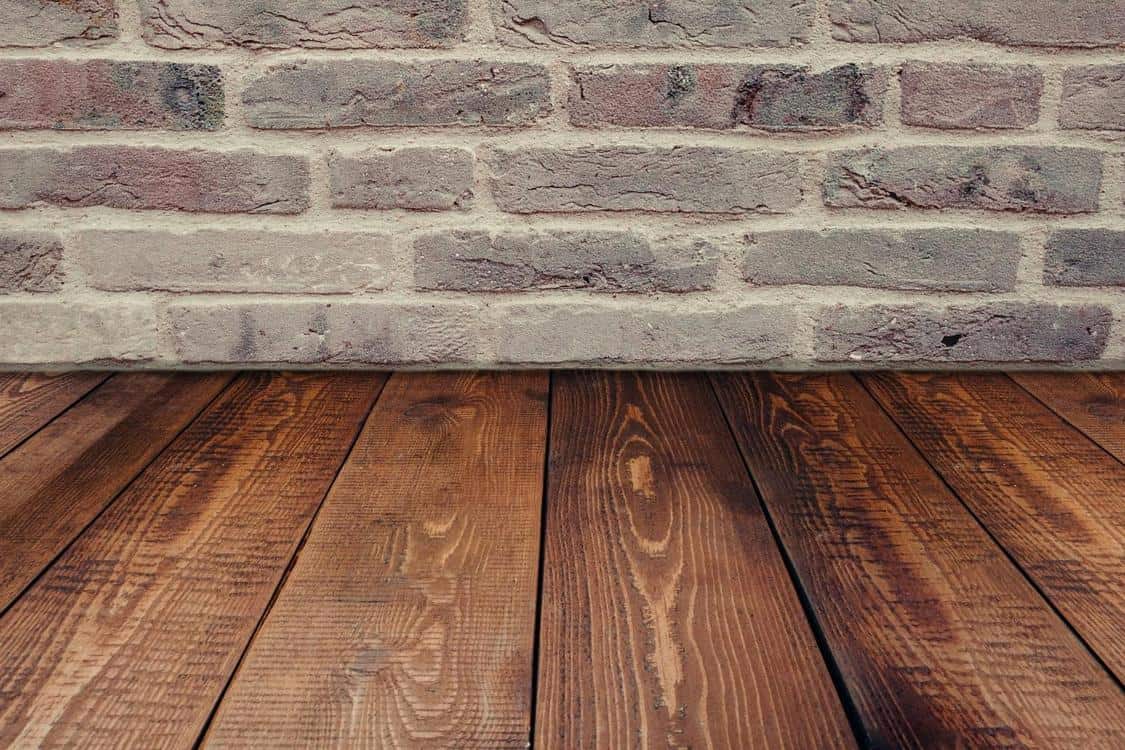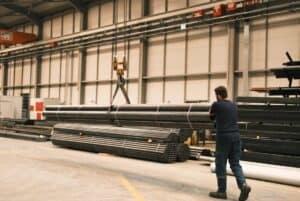Epoxy floors are long-lasting, reducing the need for flooring replacement. This reduces the environmental impact of sourcing and manufacturing new materials and reducing waste.
Businesses that require hygienic environments like food processing benefit from epoxy floors because they are easy to clean, resistant to moisture and help meet strict production standards. These floors are also durable enough to support high-traffic areas like garages and industrial settings.
1. Automotive
In facilities that focus on repairing and modifying cars, the floors take a beating from heavy vehicles and harsh chemicals. Epoxy coatings help protect the floor while increasing facility safety and productivity. They are chemical resilient and can be formulated with antimicrobial features, which helps prevent the spread of germs, keeping workplace health standards high. Epoxy is also skid-resistant, reducing the risk of slip and falls that can lead to injuries.
Because the food processing industry must adhere to strict hygiene regulations, a durable and easy-to-clean floor is crucial. With the right surface, cleaning is done quickly and thoroughly, reducing downtime and boosting production. Food-grade epoxy floor coatings are non-porous and resist stains. They can even be formulated to be electrostatic dissipative, which is ideal for electronics manufacturing where static control is vital.
The flooring at automotive dealerships and garages takes a beating from oil, gasoline, and other chemicals. Whether they are working on a car or working on an automotive machine, workers need a tough and resistant surface to stand on. Epoxy floor coatings are hard-wearing and easy to clean, reducing maintenance costs and downtime. They can also be formulated to have anti-slip properties, which is especially important in an environment where vehicles are driven around the facility.
Epoxy can be applied in a variety of color options, creating an aesthetically pleasing and customizable workspace. This feature is particularly beneficial in retail spaces and commercial buildings, where the floor can align with brand aesthetics and enhance the overall customer experience. These personalized floors can also be designed to incorporate important information into the layout of the space, such as wayfinding symbols or safety signage.
2. Food Processing
Food processing companies have to meet strict standards for hygiene and sanitation, which includes a requirement for sealed floors. This is because some foods spoil easily and the facility’s floors have to be able to prevent bacteria, mildew or mold from growing on them. As a non-porous flooring material, epoxy helps achieve this by providing an environment that is easy to clean. The resinous surface of an epoxy floor also traps dirt and dust particles, which will not be able to become airborne and contaminate the food products.
Epoxy is highly resistant to chemicals, which makes it a great option for a food processing facility. Chemical spills can be cleaned up quickly and without damaging the floor, which would otherwise have to be replaced or resurfaced. The durability of the epoxy floor means that it will be able to withstand the wear and tear of forklifts, pallet jacks or heavy equipment that is used in the food processing industry.
Aside from being an excellent choice for food processing facilities, epoxy is an aesthetically pleasing solution for many industrial environments. It can be custom-created to suit the aesthetic of a particular space and can be made in a range of textures and colors that can complement the rest of the facility. Additionally, epoxy can be stenciled with logos or wayfinding symbols to improve the usability of a space.
Unlike uncoated concrete, an epoxy floor is a durable and long-lasting flooring solution that is able to resist wear, corrosion and the effects of temperature changes. This is because the cured epoxy is formed by covalent bonds, which create an extremely strong structural material that is able to support large loads. The rigidity of the cured epoxy material can also help protect the concrete underneath it from damage due to impact and abrasion, which is an additional benefit for food processing facilities that use heavy equipment.
3. Industrial
In industrial settings, flooring must withstand heavy machinery and a variety of chemicals. Epoxy floors meet these needs, offering the strength and durability to support equipment and handle spills without damage or discoloration. They also provide a clean, hygienic environment.
These benefits are crucial in the industrial industry, where high-quality products are made to meet exacting standards. With their easy-to-clean surface, epoxy floors minimize the need for chemical cleaners or harsh detergents, saving time and money in facility maintenance. They are also moisture-resistant, making them ideal for facilities exposed to high humidity or other environmental factors.
Seamless poured epoxy floors are also superior to tile or sheet floor coverings. Their lack of seams helps to prevent the penetration of moisture or cleaning chemicals into the concrete slab underneath, which can cause an accelerated breakdown of adhesives and grouts, leading to failures. In contrast, epoxy floor coatings are able to seal cracks and other imperfections in the concrete, extending the life of your floor.
Moreover, industrial epoxy floors are customizable, with the ability to incorporate logos, wayfinding symbols, and other safety elements directly into the floor through techniques like color striping. This level of personalization offers a great deal of flexibility to commercial spaces and industrial sites alike, as they can use the floors to promote their brands while creating a safe working environment for their employees.
Epoxy is a durable floor coating that can withstand years of foot and machine traffic, chemical exposure, and even heat and shock. This makes them a perfect option for manufacturing, warehouses, and storage areas. Their ease of maintenance is also a huge benefit, as the floors are resistant to stains and can be cleaned with simple broom sweeping or vacuuming. They can even be mopped with a standard cleaning solution and water.
4. Retail
Epoxy floor coatings are ideal for retail spaces that see heavy foot traffic, carts and vehicles like forklifts. They resist abrasion and impact from these sources, helping them maintain a high level of quality that lasts a long time. This extends the life of the flooring and reduces repair and replacement costs, saving retail stores money.
Another benefit of epoxy floors in retail is ease of maintenance and sanitization. Epoxy is a very smooth surface that makes sweeping and mopping a breeze, allowing it to be cleaned thoroughly and without scratching. It also resists chemical spills, making it a safe and convenient choice for busy environments.
Finally, epoxy floors are visually appealing and can be customized to match a store’s design aesthetic. There are many glossy finishes and colors to choose from, so retailers can create a unique and eye-catching look that will draw in customers and boost brand awareness.
When choosing an epoxy contractor, it’s important to consider their experience and credentials. Look for a company that is affiliated with industry leaders or recognized epoxy manufacturers, as this often indicates a commitment to quality and best practices. Additionally, make sure the company’s team members are trained and have the knowledge and skills necessary to complete a successful installation.
The bottom line is that epoxy flooring is a smart and affordable choice for any retail space. Its durability and attractiveness help reduce costs related to repairs, maintenance and energy consumption, allowing businesses to allocate resources toward other parts of their business. The result is a space that is safer, easier to clean and more efficient, which ultimately helps improve customer satisfaction. Contact Ultrasyntec to find out how an epoxy floor can benefit your retail space.
5. Residential

Epoxy floors in homes provide a durable and attractive alternative to tile, vinyl, wood or other flooring. These floors are very low-maintenance, easy to sweep and mop, and add an elegant look to the floor of a home garage or workshop. They also boost the brightness of the space without adding costly extra lighting. They are available in a variety of colors, so homeowners can match the flooring with other design elements in their home.
Epoxies are highly durable and can stand up to heavy foot or machinery traffic. They can also be made with slip-resistant additives to prevent accidents. In addition, they can be formulated to dissipate static electricity, which is important in areas where static can damage electronic equipment or create safety hazards. In addition, epoxy coatings are environmentally friendly and emit fewer volatile organic compounds (VOCs) during installation than other types of flooring.
Choosing the right epoxy system for your needs requires careful consideration and expert advice. You should select a flooring contractor with years of experience in installing epoxy floors and have a track record of successful projects. They should also offer a warranty on their work. Look for a company that is affiliated with an epoxy manufacturer, as this may indicate their commitment to quality and best practices.
Proper surface preparation is critical to the success of an epoxy installation. This process includes cleaning, repairing and profiling the concrete substrate to ensure a strong bond with the epoxy. A professional contractor will use a variety of tools and methods for this step, including media blasting, diamond grinding, jack hammers, and chipping guns. This preparation will eliminate contaminants and voids, as well as repair cracks.




